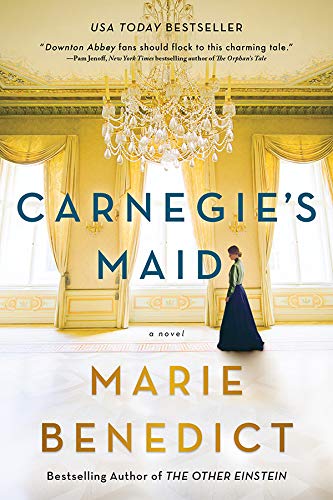Clara Kelley was sent to the US by her family in search of a job that would allow her to send money home to them, money that might help them save the family farm. She lands in Philadelphia and hopes to make her way to Pittsburgh, where she has family and will look for a job, when she impossibly hears a driver calling her name. He's actually calling for another Clara Kelley, who our Clara Kelley realizes quickly must have died on the boat over and so, without thinking, she assumes the dead woman's identity, lucking into a ride to Pittsburgh and a job as a lady's maid to Andrew Carnegie's mother, a job the farmer's daughter could never have hoped for in the regular scheme of things. As a lady's maid, she is immersed in the opulent house and furnishings, living amidst wealth unimagined. But when she visits her own family near the factories, she sees an entirely different side of the city, the struggle for survival, the grinding poverty unnoticed and unacknowledged by those in the upper echelons of society, the echelons the immigrant Carnegies are so interested in joining. She is bothered by the obvious disparity and the myriad social injustices but she cannot say anything, dependent as her family back in Ireland is on the money she sends home so she keeps her head down, learning her role as lady's maid, keeping track of Carnegie's vast holdings in an effort to understand how he gained his wealth, and using the library in the house to continue the education her quick brain demands. As she encounters Andrew Carnegie more and more often, he cannot miss her intelligence and a proper romance blooms. Will Clara allow her feelings for Carnegie to jeopardize her position and the support her family needs? Or will her loyalty to her family and the impossibility of the class differences win out?
The novel opens with Carnegie drafting a document detailing his goals for using his wealth for the benefit of others rather than for himself as a way to honor the love and beliefs of his Clara before moving back in time to the story of Clara arriving in the US and going to work for the Carnegies. The entire plot here is predicated on something incredibly improbable: not only was there a dead woman with the heroine's same name who was headed to the same city Clara needs to go to but despite Clara's upbringing on a small farm with a mother who was once a lowly scullery maid, she's convincing enough to pretend to be a competent lady's maid until she learns how to actually perform her duties, so the story takes a pretty big suspension of disbelief from the reader right from the get go. Clara also has a pretty immediate and unlikely understanding of certain legal business matters that she shouldn't have, no matter how smart she is. In spite of these coincidences and anomalies, it is interesting to see this lady's maid from the bottom of society spar with Andrew Carnegie, titan of industry, and their conversations serve to draw a fuller picture of his contradictory character. The strong emphasis on libraries and the advantage of having access to books for learning, the way Carnegie himself rose above his working class origins, was definitely interesting. There weren't many characters in the novel, and certainly few that were more than simply mentioned briefly, allowing the focus beyond Clara to be on Andrew Carnegie and his social climbing mother but also likely being historically accurate since lady's maids inhabited a lonely rung in the household structure. Carnegie was an intriguing character here; surprisingly Clara was less so, perhaps because she was rather less believable. Over all, this novel of ideas, a guess at the origin of Carnegie's philanthropy, was a fast, easy, and generally enjoyable read.




No comments:
Post a Comment
I have had to disable the anonymous comment option to cut down on the spam and I apologize to those of you for whom this makes commenting a chore. I hope you'll still opt to leave me your thoughts. I love to hear what you think, especially so I know I'm not just whistling into the wind here at my computer.